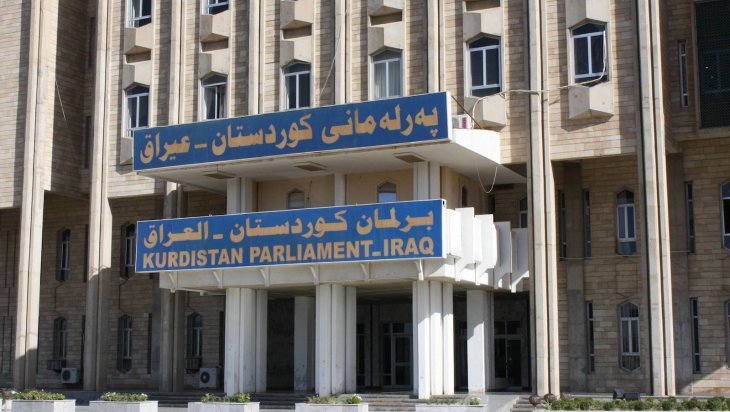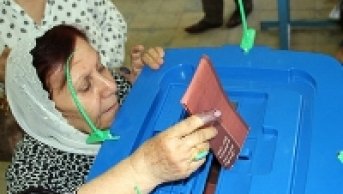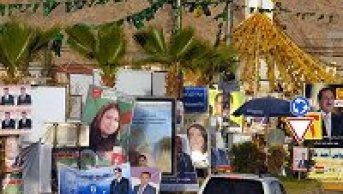KRG Parliamentary Elections and Notes on the Future of Politics

The Regional Parliamentary election in the Kurdish Regional Government (KRG), which was delayed for a year and eventually carried out in an environment where it was still possible to be postponed until the beginning of the propaganda period, was dull compared to the elections in previous years, and the developments on the election day caused great controversy.
There are two crucial differences between the elections in 2009 and 2013 in terms of the nature of the election and the atmosphere in which it was held. The most significant difference of this election from the previous elections is that it is not carried out with the Regional Presidential elections, unlike the last two elections. The gap, created with the dismissal of Massoud Barzani after the developments in 2017, did not take place in this period when the 'Basic Constitution’ of the KRG and the debate on the term and re-election of the President were combined. Therefore, only the KRG Parliamentary elections could be held on September 30th.
The second important difference of this election from the previous elections is that it was held in an atmosphere of different economic and social developments compared to the previous elections. In the last six months, the demonstrations, caused by economic problems especially in Sulaimaniyah and the east, were oppressed by force and the reaction of the public towards the increasing economic problems was an object of curiosity. This situation was not only specific to the KRG, it was also seen in the general elections held in May in Iraq. The decrease in expectation of the people from political institutions in the country and the anticipation that the power would be redistributed between the same actors instead of leading the political institutions/parties to solve the problems brought about a decrease in the participation rate. Therefore, a similar expectation was dominant in KRG.
First notes on election results
The first point that should be underlined about the election was that the participation in the elections was greatly lower than the previous parliamentary elections. The participation rate, which was 73 percent in 2013, came to be 57.96 percent. In fact, in the evaluations made in open sources on the election day, it was assessed that there was a much lower participation rate. In Erbil and Sulaymaniyah, the fact that there was a difference of 10 percent between the first announced participation rates and the official announcements in the period when the polls closed, increased the doubts about participation. Furthermore, parties such as PUK, New Generation, and all parties in Erbil, except the PUK, claimed that there was a tremendous amount of intrigue by fake identity cards in Sulaimaniyah that could affect the outcome of the election. What is more, Gorran and the New Generation have already announced that they will not accept the election results unless the Supreme Board of Elections does compensate for the fraud. Likewise, similar claims were asserted for the Iraqi General Elections held on 12 May 2018, not only in Iraq but also in the KRG. However, as it can be remembered, PUK became the most prominent party with the tricks that were allegedly carried out in Kirkuk and Sulaymaniyah. Again, the photos and video footages in the open sources show that after the voting process, the armed people attacked the election centers, disarmed the polling clerks by using violence and pecked at the observers sent by the parties. Therefore, it is quite difficult to analyze the support of the political parties in the KRG by looking at the election results and vote rates the parties obtained in the elections. There is no doubt that people's preferences give an idea for the measurement of the support for opposition parties. However, the votes of the two powerful parties, PUK and KDP, in the region seem to be closely related with their capacity to manipulate the election process and day as much as the support they receive from the electorate, maybe even more than that. In this context, the first evaluation notes will focus on the power struggle between the two major parties and the effects of this struggle on other parties.
Impacts of election results on the political parties
KDP, as expected, came out as the winner of the elections. Although the final results are not disclosed, it is expected to gain about 45 seats according to the current results. Besides, the KDP, which held 38 seats in the previous parliament, also included 9 members from the minority quota in it. In other words, even though it kept at least 47 seats in the previous parliament under control, it could not fully reflect its will in the parliament without cooperating with at least one big or two small parties. However, the number of seats to be obtained from this election will provide great convenience to the KDP in the new parliamentary arithmetic. Moreover, in this election, at least 9 of the 11 deputies from the minority quota appear to be elected from KDP supporters. According to the results to be finalized, the KDP may be able to reach the required number of 56 to obtain the vote of confidence in the Assembly with 2 or 3 seats. In this case, it could form the government by cooperating with a small party, which would allow it to dominate the system more easily. Since the KDP knows that this can even lead to the division of the region, it will most likely not go to form a government alone. However, on June 22, 2016, that the decision providing for the election of the KRG President not by the public but by the Parliament and the repetition of this development considered as the most serious step back in parliamentary history for the KDP seem to be in cold storage. Therefore, KDP must be seen as the most important winner of the election.
In spite of all objections and problems that emerged on the election day, the PUK became the second party. Although the PUK which lost its position as the second or “main opposition” party (when all of the parties enter the government, there is no such position) to Gorran in the last election had a decrease in the total vote it received (taking into account that Barham Saleh's Democracy and Justice Party entered the elections with the PUK, in fact, despite all intrigue claims, according to the Iraqi General Elections, the number of votes remained two thirds of the pre-election total amount of the two alliances), 21 (which can also be 22) that it obtained in total is well ahead of other parties. In view of the fact that despite all the allegations of cheating, according to Iraqi Parliamentary Elections, the number of votes remained in two-thirds of the total of the two alliances before the election). The PUK who always draws away Gorran in each election after falling behind it with six seats in the 2013 elections, was probably on a power trip by having 9-10 more seats than Gorran in the elections. However, the PUK is not a party that can be an opposition party. The PUK, governed by an alliance based on the optimal distribution of economic resources and political benefits, will do its utmost to be part of the government. Aside from its power in the parliament, the number of PUK peshmerga has as many as the KDP prevents the PUK from being a negligible party. The most important difference between the PUK and the other parties is the fact that it would not bow to the pressures by the KDP or other parties thanks to its military power and widespread party organization.
Even if the KDP has the possibility to find government formation formulas to exclude PUK, it will not be able to show its political power in Suleymaniyah unless the PUK wants it. In other words, the KDP will not bring Gorran member Yousif Mohammed Sadiq, the president of the previous parliament, to Erbil and is not in a position to make the PUK accept the very same practice even though it has the power to dismiss the ministers from the Gorran movement. Moreover, as will be discussed below, Barham Saleh's election as the Iraqi President can put an end to the long-standing turbulent period in the PUK. Moreover, Hero Talabani and his sons, who have weakened Kosrat Rasul who sent Barham Saleh to Baghdad, can be expected to restore family monopoly in PUK.
In Gorran, which had the most significant rise in the last elections, on the other hand, the decline still continues. After the death of Gorran leader Nawshirwan Mustafa, the struggle between leadership at the party and the debate between the older generations and the new leader candidates increased. The number of seats and votes that are halved compared to the previous election will probably bring the end of Omar Said Ali. Within the party, someone from the younger generation can take the current leader's position in a short while. The reasons why Gorran has weakened can be asserted to be a result of both its internal contradictions and its inability to respond to the pressures of the PUK. The most important criticism directed at Gorran is that it is inconsistent. The fact that it became a government partner in 2013 despite its departure as an opponent, and then its return back to the opposition is the most obvious example of this inconsistency. When a little closer look is taken at the two main reasons mentioned above, the main problems of Gorran can be enumerated as follows: The New Generation Movement’s steps to rally with some opposition (for example, the former group president of Gorran Party in the KRG Parliament is now a Baghdad deputy from the New Generation), the leadership struggle within the party, the emergence of similar cases of corruption in the Gorran just like in the PUK and the KDP and the fear of its supporters in the face of the threat posed by the armed forces of the PUK, which all have weakened Gorran. Ultimately, it should be emphasized that Gorran did not succeed in organizing the protests and turning them into a political advantage for itself at the time of the protests in KRG. Nevertheless, it should be kept in mind that this decline is very low compared to the 2018 Iraqi parliamentary elections, although there has been a 50% decrease in Gorran's votes compared to 2013.
The New Generation Movement, participating in the KRG parliamentary election for the first time, maintained its continuity, even though it suffered a loss of votes, according to the May 2018 election. For the second time after May, it succeeded in overcoming Islamic parties. Although it rejects the election results, it can be said that if the PUK does not join the government, it may a partner of the new government because of its pragmatist attitude. For now, it has not managed to pass Gorran. However, in the case of Gorran's weakening, it is highly likely to attract those who dislike the KDP and PUK and to be a new address for them.
The Islamist parties, seen as the main opposition forces in the region when the KDP and PUK dominated the system in the KRG, have come to compete among each other. According to May 2018, although the total votes of two separate actors increased slightly, the results of the last elections show that the Islamist parties will remain small actors in the KRG policy if they do not make alliances. The sum of the votes three Islamist parties obtained fell back to 12.8 percent in 2009. This rate was 16 percent in 2013. There are two main points to which we should pay attention here: The first is that, despite the decline in the votes of the Islamist parties, the three parties have the potential to sit in the third place after the PUK if they enter the election together. The second one is that the more conservative line continues to strengthen despite the weakening of the Ikhwan line.
First Expectations About Election Results
The first thing that the election process and the results show is that if the current socioeconomic tendencies in the KRG continue, the possibility of an atmosphere of turmoil to which the current political institutions cannot find a solution in the region will increase. The decline in people's belief in political institutions increasingly leads to a decline in participation in the elections (especially after the same things were experienced in the May 2018 general elections). For this reason, there may be developments similar to the protests that will emerge and not be possible to be controlled by the political parties in the same way as in the Basra city of Iraq.
The forecasts for the near future can be summarized as follows:
The KDP will become more effective than ever before in the parliament. If a coalition government is formed, it can occur in two ways: either a KDP-PUK consensus-based government in which the two parties re-dominate the system or a government in which the KDP will not want to share a cake with a stronger party but a small one and will punish the PUK.
Barham Saleh's election as Iraqi President despite all objections by the KDP and Masoud Barzani harsh response make us think in the short-term that the KDP will first exclude PUK and then cooperate with the parties that oppose it most to punish PUK. However, it can be said that the effect of a government that would exclude PUK on Sulaymaniyah may remain ambiguous, and if the KDP-PUK rivalry increases, there may be developments that may even reach the level of the actual disintegration of the region. Therefore, probably both parties will not engage in such an irrational attitude for themselves. It is more likely that the hard reactions seen at the moment will be relieved after a while. For even though the two parties sometimes make harsh statements, they will not be willing for a conflict environment due to the current economic conditions and increasing public reaction.
Ironically, the KDP has begun to weaken in Baghdad when it has entered its most powerful period in the KRG Parliament. The fact that it formed an alliance with Nouri al-Maliki in the presidential elections and failed could result in another failure in its representation in Iraq's new government. Moreover, this situation becomes more striking given the special relations of Adil Abdul Mehdi, commissioned by Barham Saleh, with PUK.
The most important problem for the opposition parties is the leadership race in Gorran and the efforts of the New Generation to survive. Although they criticize the KDP, the possibility that the New Generation will be included in the government should not be neglected.
Another result of the election is that the balance within the PUK is completely transformed in favor of Hero Talabani. The leader of the PUK, who escaped from an important rival by sending Saleh to Baghdad, became the sole ruler of the party due to the weakening of Kosrat Rasul. The internal balances in the PUK are still very sensitive; however, the PUK has prevented the collapse and it seems to be strengthening again.







